新概念第一测
新概念英语第一册课文及翻译
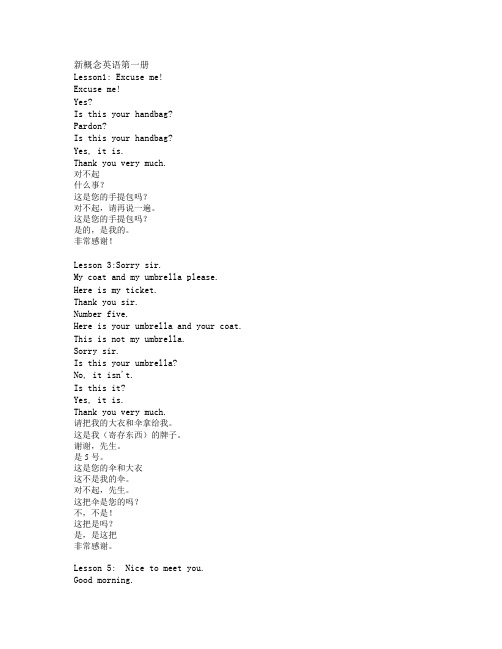
新概念英语第一册Lesson1: Excuse me!Excuse me!Yes?Is this your handbag?Pardon?Is this your handbag?Yes, it is.Thank you very much.对不起什么事?这是您的手提包吗?对不起,请再说一遍。
这是您的手提包吗?是的,是我的。
非常感谢!Lesson 3:Sorry sir.My coat and my umbrella please. Here is my ticket.Thank you sir.Number five.Here is your umbrella and your coat. This is not my umbrella.Sorry sir.Is this your umbrella?No, it isn't.Is this it?Yes, it is.Thank you very much.请把我的大衣和伞拿给我。
这是我(寄存东西)的牌子。
谢谢,先生。
是5号。
这是您的伞和大衣这不是我的伞。
对不起,先生。
这把伞是您的吗?不,不是!这把是吗?是,是这把非常感谢。
Lesson 5: Nice to meet you.Good morning.Good morning, Mr. Blake.This is Miss Sophie Dupont.Sophie is a new student.She is a French.Sophie, this is Hans.He is German.Nice to meet you.And this is Naoko.She‟s Japanese.Nice to meet you.And this is Chang-woo.He‟s Korean.Nice to meet you.And this is Luming.He‟s Chinese.Nice to meet you.And this is Xiaohui.She‟s Chinese, too.Nice to meet you.布莱克先生:早上好。
新概念英语第一册课文及翻译
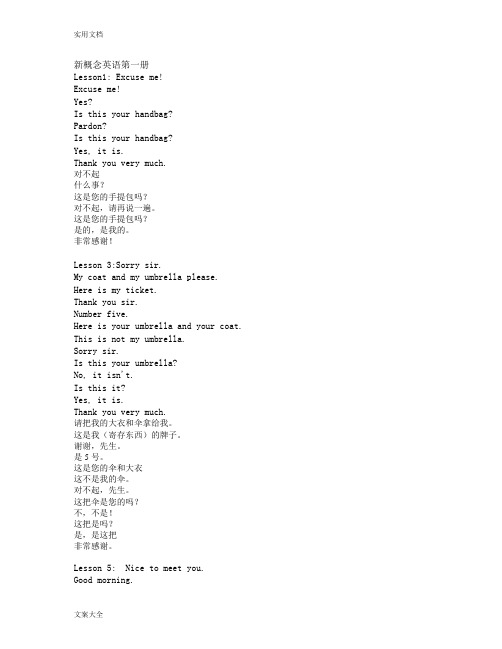
新概念英语第一册Lesson1: Excuse me!Excuse me!Yes?Is this your handbag?Pardon?Is this your handbag?Yes, it is.Thank you very much.对不起什么事?这是您的手提包吗?对不起,请再说一遍。
这是您的手提包吗?是的,是我的。
非常感谢!Lesson 3:Sorry sir.My coat and my umbrella please. Here is my ticket.Thank you sir.Number five.Here is your umbrella and your coat. This is not my umbrella.Sorry sir.Is this your umbrella?No, it isn't.Is this it?Yes, it is.Thank you very much.请把我的大衣和伞拿给我。
这是我(寄存东西)的牌子。
谢谢,先生。
是5号。
这是您的伞和大衣这不是我的伞。
对不起,先生。
这把伞是您的吗?不,不是!这把是吗?是,是这把非常感谢。
Lesson 5: Nice to meet you.Good morning.Good morning, Mr. Blake.This is Miss Sophie Dupont.Sophie is a new student.She is a French.Sophie, this is Hans.He is German.Nice to meet you.And this is Naoko.She’s Japanese.Nice to meet you.And this is Chang-woo.He’s Korean.Nice to meet you.And this is Luming.He’s Chinese.Nice to meet you.And this is Xiaohui.She’s Chinese, too.Nice to meet you.布莱克先生:早上好。
(完整)新概念英语第一册详细讲解
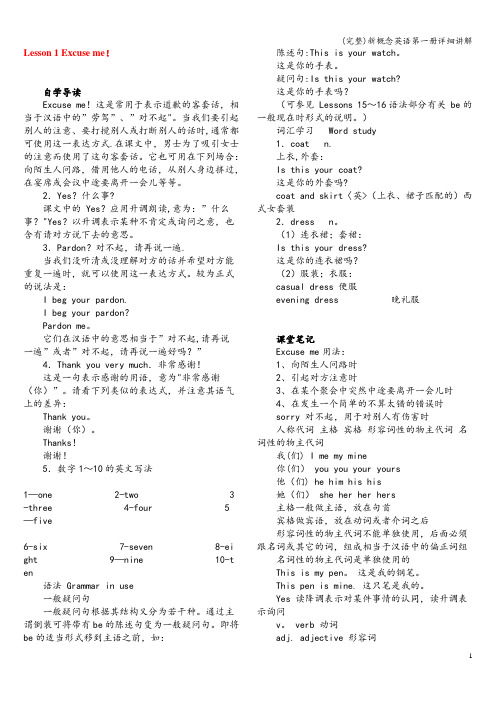
Lesson 1 Excuse me!自学导读Excuse me!这是常用于表示道歉的客套话,相当于汉语中的”劳驾”、”对不起"。
当我们要引起别人的注意、要打搅别人或打断别人的话时,通常都可使用这一表达方式.在课文中,男士为了吸引女士的注意而使用了这句客套话。
它也可用在下列场合:向陌生人问路,借用他人的电话,从别人身边挤过,在宴席或会议中途要离开一会儿等等。
2.Yes?什么事?课文中的 Yes?应用升调朗读,意为:”什么事?"Yes?以升调表示某种不肯定或询问之意,也含有请对方说下去的意思。
3.Pardon?对不起,请再说一遍.当我们没听清或没理解对方的话并希望对方能重复一遍时,就可以使用这一表达方式。
较为正式的说法是:I beg your pardon.I beg your pardon?Pardon me。
它们在汉语中的意思相当于”对不起,请再说一遍”或者”对不起,请再说一遍好吗?”4.Thank you very much.非常感谢!这是一句表示感谢的用语,意为"非常感谢(你)”。
请看下列类似的表达式,并注意其语气上的差异:Thank you。
谢谢(你)。
Thanks!谢谢!5.数字1~10的英文写法1—one 2-two 3 -three 4-four 5—five6-six 7-seven 8-ei ght 9—nine 10-t en语法 Grammar in use一般疑问句一般疑问句根据其结构又分为若干种。
通过主谓倒装可将带有be的陈述句变为一般疑问句。
即将be的适当形式移到主语之前,如:陈述句:This is your watch。
这是你的手表。
疑问句:Is this your watch?这是你的手表吗?(可参见 Lessons 15~16语法部分有关 be的一般现在时形式的说明。
)词汇学习 Word study1.coat n.上衣,外套:Is this your coat?这是你的外套吗?coat and skirt〈英>(上衣、裙子匹配的)西式女套装2.dress n。
(完整版)新概念英语第一册1-10课件
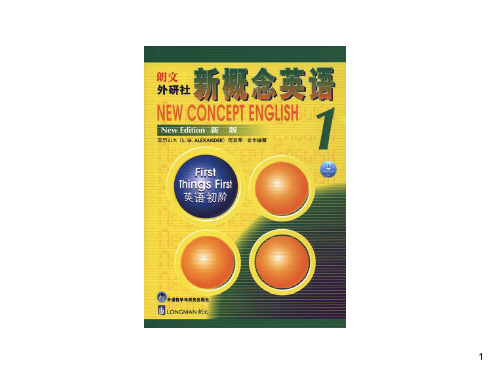
考一考
谁
谁的
• A.
I
you
he
She
105
考一考
谁
谁的
• A.
I
my
you
your
he
his
She
her
106
• What’s • • •
your job? his her my
107
考一考
• A.
I
He
am, is
She
人名(Sophie, Mr.Blake)
108
考一考
• A.
10
11
Sentences
• Is this your ____ ? • Yes, it is./ No, it isn’t.
12
Bags (包包大聚会)
handbag wallet
schoolbag purse
13
Bags (包包大聚会)
suitcase
backpack
mobile phone bag computer bag 14
50
What are their nationalities?
name
nationality
Sophie Dupont
Hans
Naoko
Chang-woo
Luming
Xiaohui
51
What are their nationalities?
name
nationality
Sophie Dupont
75
• B. • This is a Volvo. Swedish/French • Is it a Swedish car or a French car? • It isn’t a French car. It’s a Swedish car.
新概念英语第一册讲义(完整版)

新(一)讲课步骤一上课(起立问好)1.自我介绍;2.介绍新(一)分三期学完, 本期从第1—48课,全册分三期学完;3.宣读《学生守则》;强调安全及纪律性;二正课部分1. 单词讲解:先让学生逐个起来诵读单词,学生读一个老师讲一个;教师对单词讲解并拓词.单词完先由老师领读(一升一降),然后再找学生带读、齐读。
2. 语法:在黑板上标明“语法”与“语法内容”讲解语法须标明各项内容名称,如“定义”“构成,步骤”等。
语法讲解后领学生做“课堂语法练习题”(或利用练习册语法题部分)或汉译英。
3. 课文:听录音(合着书)回答课题中的问题,要求学生将答案写在书上。
分析课文的内容,划出本课的语法现象(短语、句子)用符号●标出,称为语法符号。
抽词组并对课文中的专有名词(人名、地名)标出音标。
学生齐读或学生分角色朗读课文。
三副课部分1.单词讲解(同正课部分):此部分灵活掌握,如单词较少或补充内容不多,可与正课单词放在一块讲解。
处理课后练习和课课练。
2.语法讲解.四做练习1. 副课填空题:当堂必须全部完成,对答案;2. 句型题要求:A 较简单的题,须说明步骤、技巧。
B 较难的题,须把题型板书到黑板上,再说明做题步骤、技巧。
C 如句型题中出现新的语法现象,须将语法讲解清楚,带着学生做题。
D 句型题根据上课具体情况安排,数个至全部在课堂上由学生完成,其余题或典型题留成作业。
五作业:学生应准备三个本,(两个作业本AB,一个听写本)1.课文(正课)背写一遍→家长签字。
收改;2.单词(正课+副课)带音标抄3遍。
汉语一遍收改(前48课第一期,后两期可省去);3.课后练习题(句型题)做在本子上,前5个或一半,收改;4.课课练与本课对应练习完成。
收改;(其中难题在第四部分上课解决)。
5.单词、课文在下次课上分别听写、默写,100分者在听写本上扣章。
6.奖励方法:听写得连续5个一级棒,换一个小博士, 一期结束,看谁得最多有奖品;六其他:1.收测试卷费,订课课练答案;2.严格遵守“喝茶”及“考试、考勤”制度;3. 试卷考完后利用课堂最后的时间进行讲解,考试内容较多的分次讲解。
新概念英语第一册重点知识点概括
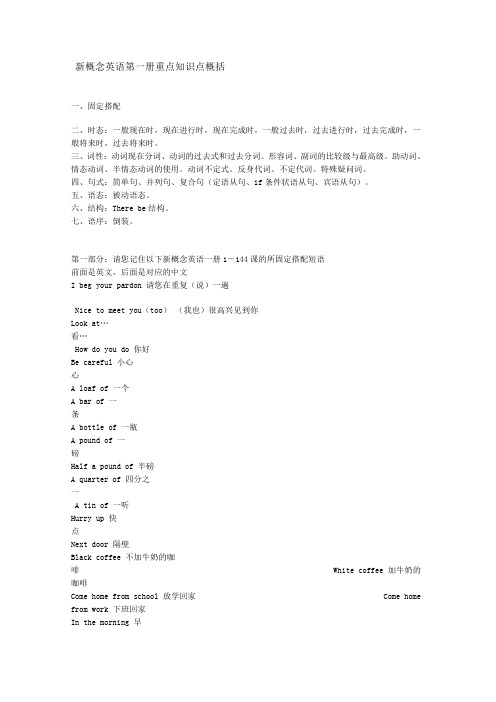
新概念英语第一册重点知识点概括一、固定搭配二、时态:一般现在时,现在进行时,现在完成时,一般过去时,过去进行时,过去完成时,一般将来时,过去将来时。
三、词性:动词现在分词、动词的过去式和过去分词。
形容词、副词的比较级与最高级。
助动词、情态动词、半情态动词的使用。
动词不定式。
反身代词、不定代词。
特殊疑问词。
四、句式:简单句、并列句、复合句(定语从句、if条件状语从句、宾语从句)。
五、语态:被动语态。
六、结构:There be结构。
七、语序:倒装。
第一部分:请您记住以下新概念英语一册1-144课的所固定搭配短语前面是英文,后面是对应的中文I beg your pardon 请您在重复(说)一遍Nice to meet you(too)(我也)很高兴见到你Look at…看…How do you do 你好Be careful 小心心A loaf of 一个A bar of 一条A bottle of 一瓶A pound of 一磅Half a pound of 半磅A quarter of 四分之一A tin of 一听Hurry up 快点Next door 隔壁Black coffee 不加牛奶的咖啡 White coffee 加牛奶的咖啡Come home from school 放学回家 Come home from work 下班回家In the morning 早上In the afternoon 下午In the evening 晚上At noon 中午At night 夜里At the moment 此刻What’s the time? 几点钟? Come upstairs 上楼Come downstairs 下楼 Hundreds of… 数以百计的…On the way home 在回家的途中 This morning 今天早晨This afternoon 今天下午 This evening 今天晚上tonight 今天夜里 Yeste rday morning 昨天早晨Yesterday afternoon 昨天下午 Yesterday evening 昨天晚上Last night 昨天夜里 The day before yesterday in the morning 前天早晨The day before yesterday in the afternoon 前天下午The day before yesterday in the evening 前天晚上The night before last 前天夜间 A low mark 分数很底A high mark 分数很高 She said to herself 她心中暗想The way to… 到…的走法 In fashion 流行的,时髦的I’m afraid… 我恐怕…I’m sure… 我确信,我肯定…A lot of 许多(用于肯定句) At all 丝毫、更本、一点也不Going on holiday 度假 Have beento… 到过…All the time 一直,始终 Drive into… 撞倒…For sale 供出售、出售 Have the last word 最后决定、最后才算The R.A.F. 英国皇家空军 Return ticket 往返票Next door to… 与…相邻,在…隔壁In five hours’time 在五小时之后。
新概念英语第一册完整版
She is going to see her grandpa tomorrow. 她打算明天去看望她的爷爷。
adv. 还,仍旧 v. 搬家 v. 想念,思念 n. 邻居 n. 人 n. 人们 adj. 可怜的
第9页/共23页
★still
① adv. 还是,仍然 • I still can’t decide where to go. • 我还是不能决定去哪。 • She was still beautiful at the age of 46. • 她46岁时仍然美丽。 ② adv. 还要,甚至更 • She looked very ill last week and this week
第4页/共23页
③结构:
主语+助动词will/shall+动词原形(shall可用于第一人称I, we) I will go to America tomorrow. 明天我将去美国。
Jack will move into his new house tomorrow morning. 今晚杰克将要搬进新家。
4)When will the new people move into this house?
They'll move in the day after tomorrow.
5)Will Jenny see Ian today,?
Yes,she will.
第17页/共23页
CATHERINE:Has Ian sold his house yet?
新概念英语第一册课文(全中文)
新概念英语第一册课文(全中文) $课文1对不起!1对不起2什么事?3这是您的手提包吗?4对不起,请再说一遍。
5这是您的手提包吗?6是的,是我的。
7非常感谢!$课文3对不起,先生。
8请把我的大衣和伞拿给我.9这是我(寄存东西)的牌子。
10谢谢,先生。
11是5号。
12这是您的伞和大衣13这不是我的伞。
14对不起,先生。
15这把伞是您的吗?16不,不是!17这把是吗?18是,是这把19非常感谢.$课文5很高兴见到你。
20早上好。
21早上好,布莱克先生。
22这位是索菲娅23索菲娅是个新学生。
24她是法国人。
25索菲娅,这位是汉斯.26他是德国人.27很高兴见到你。
28这位是直子。
29她是日本人.30很高兴见到你.31这位是昌宇。
32他是韩国人。
33很高兴见到你。
34这位是鲁明。
35他是中国人。
36很高兴见到你.37这位是晓惠.38她也是中国人。
39很高兴见到你。
$课文7你是教师吗?40我是个新学生,41我的名字叫罗伯特。
42很高兴见到你.43我的名字叫索菲娅.44你是法国人吗?45是的,我是法国人。
46你也是法国人吗?47不,我不是。
48你是哪国人?49我是意大利人。
50你是教师吗?51不,我不是。
52你是做什么工作的?53我是电脑录入员。
54你是做什么工作的?55我是工程师.$课文9今天好吗?56你好,海伦57你好,史蒂文58你今天好吗?59很好,谢谢你。
60你好吗?61很好,谢谢。
62托尼好吗?63他很好,谢谢。
64埃玛好吗?65她也很好,海伦。
66再见,海伦。
67见到你真高兴。
68我见到你也很高兴,史蒂文。
69再见。
$课文11这是你的衬衫吗?70那是谁的衬衫?71戴夫,这是你的衬衫吗?72不,先生.73这不是我的衬衫。
74这是我的衬衫。
75我的衬衫是蓝色的。
76这件衬衫是蒂姆的吗?77也许是,先生。
78蒂姆的衬衫是白色的。
79蒂姆!80什么事,先生。
81这是你的衬衫吗?82是的,先生。
83给你。
84接着!85谢谢您,先生。
新概念英语第一册1-30课主要内容
新概念英语第一册1——30课1——4课简单的问候,打招呼。
This is …句式及其一般疑问句式5——8课询问国籍和职业及车或某物品的牌子。
What’s your job?What nationality are you?What make is it ?am 、is 、are 的用法及练习he、she、it的用法9——12课询问身体状况的用语,fat、thin等形容词名词所有格已经用whose对名词所有格提问的问法。
Whose is this handbag? 同义句Whose handbag is this ?It’s her... handbag.(形容词性物主代词)It’s Stella......’.s..(名词所有格)对whose问句的回答应用名词所有格或物主代词。
13——16课对颜色的提问What colour is …?祈使句 Come upstairs and see it .单数名词变复数的规则以及变复数后“s”的发音规则。
17——20课对工作(多数人)的问法What are their jobs?另一部分名词复数的变法询问有什么麻烦有什么需要的问法What’s the matter ?What’s wrong with …同义句一部分形容词及be动词的练习21——24课形容词及厨房用品名词对定语的提问Which one ?(对单数提问)Which ones?(对复数提问)形容词性物主代词的用法人称代词宾格的写法及用法25——28课There be 句型对地点名词及表示方位的介词短语提问的用法Where is it ?Where are they ?重点练习There be句型There be(is、are)+名词+表示方位的介词短语一般疑问句把be动词(is、are)提前,some变any加问号29——30课祈使句的用法和结构情态动词must的用法What must I do ?。
(完整版)新概念英语第一册1-10课件(共152张PPT)
L3 Sorry, sir
• Does the man get his umbrella?
26
New word and expressions
umbrella cloak
ticket cloakroom
27
New word and expressions
suit
school
teacher
son daughter
12
Bags (包包大聚会)
handbag wallet
schoolbag purse
13
Bags (包包大聚会)
suitcase
backpack
mobile phone bag computer bag 14
包包大比拼2-1
15
包包大比拼2-2
16
生活百科-世界名包系列
LV 路易·威登
古琦
key
keyboard
keyboard operator
engineer 94
New word and expressions
I
nationality
am
job
are
keyboard
name
operator
what
engineer
95
学一学
• 今天我们要学习一类名词—— 职业。
• 名词的英文是noun. • 缩写为n.
Mr
German
good
nice
morning
meet
Miss
Japanese
new
Korean
student
Chinese
French
too
49
- 1、下载文档前请自行甄别文档内容的完整性,平台不提供额外的编辑、内容补充、找答案等附加服务。
- 2、"仅部分预览"的文档,不可在线预览部分如存在完整性等问题,可反馈申请退款(可完整预览的文档不适用该条件!)。
- 3、如文档侵犯您的权益,请联系客服反馈,我们会尽快为您处理(人工客服工作时间:9:00-18:30)。
一.时态:一般现在时,现在进行时,一般过去时,现在完成时,一般将来时,过去进行时,过去完成时,过去将来时1. 一般现在时表示一般性,经常性的动作或一般性事实。
u 含有be动词的句子He is a teacher.The girl is very beautiful.Tim and Jack are students.★变疑问句将be动词移到句首Is he a teacher?Is the girl very beautiful?Are Tim and Jack students?★变否定句在be动词后面加notHe is not a teacher.The girl is not very beautiful.Tim and Jack are not students.★肯定回答及否定回答Yes, he is. No, he is not.Yes, she is. No, she is not.Yes, they are. No, they are not.u 不含有动词的句子,即含有一般动词的句子第三人称单数及单数名词He likes books.She likes him.The dog likes bones.★变疑问句在句首加does, 动词变为原型Does he like books?Does she like him?Does the dog like bones?★变否定句在主语及动词之间加doesn’t, 动词变为原型He doesn’t like books.She doesn’t like him.The dog doesn’t like bones.★肯定回答及否定回答:Yes, he does. No, he doesn’t.Yes, she does. No, she doesn’tYes, it does. No, it doesn’t.注意:第三人称单数形式一般在动词后面加S,不要和名词复数混淆,变否定句或疑问句时名词复数没有任何变化。
其他人称及复数名词I want to have a bath.We have some meat.The students like smart teachers.★变疑问句在句首加doDo you want to have a bath?Do we have any meat?Do the students like smart teachers?★变否定句在主语和动词之间加don’t.You don’t want to have a bath.We don’t have any meat.The students don’t like smart teachers.★肯定回答及否定回答Yes, I do. No, I don’t.Yes, we do. No, we don’tYes, they do. No, they don’t.2. 现在进行时表示现在正在进行的动作。
构成:主语+be动词+动词的现在分词+其它成分(现在分词的构成见附录)We are having lunch.He is reading a book.The dog is running after a cat.The boys are swimming across the river.★变疑问句将be动词移到句首Are we having lunch?Is he reading a book?Is the dog running after a cat?Are the boys swimming across the river?★变否定句在be动词后面加 notWe are not having lunch.He is not reading a book.The dog is not running after a cat.The boys are swimming across the river.★特殊疑问句:what, which, how, where, who, etc.疑问词+动词+主语+现在分词What are you doing?What is she doing?What is the dog doing?(必背)没有进行时的动词表示状态,思想,感情和感觉的动词不能表示正在进行的动作1. 表示感觉,感官的词see, hear, like, love, want,2. have, has当”拥有”讲时没有进行时3. 一般过去时表示过去发生的动作或事件,常和表示过去的时间状语连用,如yesterday, last night, the day before yesterday, 3 days ago,含有be动词的句子,将动词变为过去式,am, is的过去式为was,are的过去式为wereI was at the butcher’s.You were a student a year ago.The teacher was very beautiful ten years ago.★变疑问句将be动词移动到句首Were you at the butcher’s?Were you a student a year ago?Was the teacher very beautiful ten years ago?★变否定句在be动词后面加notI was not at the butcher’s.You were not a student a year ago.The teacher was not very beautiful ten years ago.★肯定回答否定回答Yes, I was. No, I was not.Yes, you were. No, you were not.Yes, he/she was. No, he/she was not.★特殊疑问句:What did you do?(必背)不含有be动词的句子,将动词变为过去式,动词过去式构成见附录I finished my homework yesterday.The boy went to a restaurant.The Sawyers lived at King Street a year ago.★变疑问句在句首加did,动词变为原型Did you finish your homework yesterday?Did the boy go to a restaurant?Did the Sawyers live at King Street a year ago?★变否定句在主语和动词之间加did notI did not finish my homework yesterday.The boy did not go to a restaurant.The Sawyers did not live at King Street a year ago.★肯定回答及否定回答Yes, I did. No, I didn’t.Yes, he did. No, he didn’t.Yes, they did. No, they did not.4. 现在完成时构成:主语+助动词have, has+过去分词用法:1) 表示过去发生的和现在有某种联系的动作,常和just, usually, already, since等时间副词连用I have just had lunch. (饱了,不用再吃了)He has had a cup of tea.(不渴了,不用再喝)They have already had their holiday. (不能再度假了)The boy has already read the book. (已经知道书的内容了,不用再看了)2) 询问别人是否做过某事一般用现在完成时:Have you finished your homework?Have you been to Beijing?Have he seen the film?3) 表示开始于过去并持续到现在的动作I have lived in Beijing for twenty years.I have worked for this school for 1 year.4) 表示一种经历,经验:去过…地方,做过…事情,经历过…事情I have never had a bath.I have never seen a film.I have never been to cinema.I have ever been to Paris.Have been to表示去过,have gone to 表示去了I have been to London.( 人已经回来)He has gone to London.(人还在那里)5) 表示一种结果,一般不和时间副词联用I have lost my pen.I have hurt myself.He has become a teacher.She has broken my heart.句型变化:★变疑问句将助动词移到句首,变否定句在助动词后面加not.e.g. Have you lost your pen? I have not lost my pen.★肯定回答及否定回答Yes, I have. No, I have not.★特殊疑问句:What have you done?What has he done?一般过去时与现在完成时的区别:凡是有明确的表示过去的时间状语的句子为过去时注意:有些动词表示的动作有一个终点,不能再延续,因此不能和表示一段时间状语连用错:I’ve left Beijing for 3 days.对:I left Beijing 3 days ago. I have been away from being for 3 days.5. 一般将来时表示将来将要发生的动作,经常和tomorrow, next year, the day after tomorrow, the year after the next, in five hours’ time, etc. 表示将来的词联用结构:主语+助动词will+动词原形I will go to America tomorrow.The pilot will fly to Japan the month after the next.Jack will move into his new house tomorrow morning.★变疑问句将助动词移到句首Will you go to America tomorrow?Will the pilot fly to Japan the month after the next?Will Jack move into his new house tomorrow morning?★变否定句在助动词后面加notI will not go to America tomorrow.The pilot will not fly to Japan the month after the next.Jack will not move into his new house tomorrow morning★肯定回答及否定回答Yes, I will. No, I will not.Yes, he/she will. No, he/she will not.Yes, he will. No, he will not.★特殊疑问句:What will you do?6. 过去完成时:用法:在过去的时间里,两个动作中,发生在前的哪个动作要用过去完成时。
